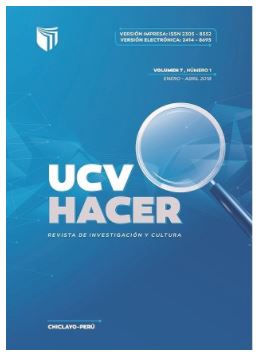Efficiency of probiotic microbial consortiles in the treatment of domestic and industrial wastewater
DOI:
https://doi.org/10.18050/ucv-hacer.v9i1.555Keywords:
Wastewater, Probiotics and wastewater, Nitrobacter plus ®Abstract
To measure the efficiency of microbial consortia formed by Nitrobacter sp. Nitrosomonas sp. Bacillus subtilis, Bacillus licheniformes, Saccharomices cereviceae, Saccharomyces fragilis in the treatment of urban wastewater, variables defined in DS 003-2010-MINAM were measured. The Nitrobacter plus ® brand probiotic suspension was diluted in deionized water, then molasses and urea were added constantly stirring for 96 hours, subsequently added to wastewater samples from the PTAR of the city of Lambayeque and Santa Rosa (Chiclayo), with the experimental design with increasing stimulus: Control, 0 ml; Dilution 1: 24 mL / L, Dilution 2: 48 mL / L, Dilution 3: 72 mL / L, Dilution 4: 96 mL / L in 20 L buckets. It was concluded that the most noticeable effect on the wastewater of the PTAR of the city of Lambayeque was verified in the decrease of BOD5 up to 48.2 mg / L and the population of thermotolerant coliforms up to 524 NMP / 100 mL. 2. The concentration of Probiotics of 96 mL / L allowed to obtain better quality wastewater. 3. Urban wastewater from Santa Rosa and Lambayeque presented better quality at 96 hours in dilutions of 72 mL / L and 96 mL / L of Probiotics; 4. In the treatment of wastewater from both places, better quality was obtained at 96 hours of the experiment, with values lower than the LMP set by DS 003-2010-MINAM.
Downloads
Published
How to Cite
Issue
Section
License

This work is licensed under a Creative Commons Attribution-NonCommercial 4.0 International License.










